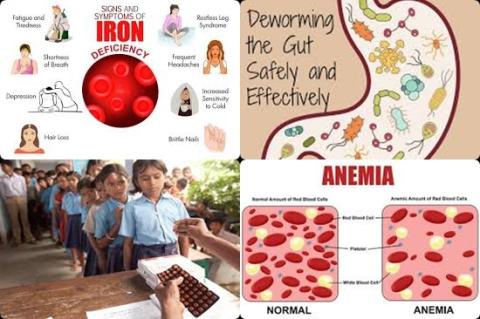
Objectives:
The impact of deworming on parasite load, nutritional status and other health outcomes of non-pregnant adolescent girls and adult women is uncertain. Therefore, this review article has been conducted.
Have deworming beneficial effects on health outcomes of non-pregnant adolescent girls and adult women 10 to 49 years old?
Study design:
This review article included 4 RCTs of mass deworming involving 1,086 participants.
Outcomes of interest included parasite load, reinfection, anaemia, severe anaemia, iron deficiency, diarrhoea or all-cause morbidity.
Risk of bias was assessed using the Cochrane risk of bias tool.
The WHO guideline was used for severe anaemia, defined by haemoglobin levels 80 g/L.
None of the included studies assessed screen and treat deworming or reported reinfection, diarrhoea or adverse events.
Results and conclusions:
The investigators found compared to the control group, mass deworming significantly reduced risk of roundworm infection with 71% [RR = 0.29, 95% CI = 0.14 to 0.62, 2 trials, 1,498 participants, moderate certainty evidence].
Significantly because RR of 1 was not found in the 95% CI of 0.14 to 0.62. RR of 1 means no risk/association.
The investigators found compared to the control group, mass deworming significantly reduced risk of hookworm infection with 68% [RR = 0.32, 95% CI = 0.18 to 0.59, 2 trials, 1,498 participants, moderate certainty evidence].
Significantly means that there is an association with a 95% confidence.
The investigators found compared to the control group, mass deworming significantly reduced risk of whipworm infection with 23% [RR = 0.77, 95% CI = 0.65 to 0.91, 2 trials, 1,498 participants, moderate certainty evidence].
The investigators found compared to the control group, mass deworming non-significantly reduced risk of anaemia with 18% [RR = 0.82, 95% CI = 0.60 to 1.11, 3 studies, 683 participants, low certainty evidence].
Non-significantly because RR of 1 was found in the 95% CI of 0.60 to 1.11. RR of 1 means no risk/association.
The investigators found compared to the control group, mass deworming non-significantly reduced risk of iron-deficiency with 11% [RR = 0.89, 95% CI = 0.64 to 1.23, 1 study, 186 participants, low certainty evidence].
Non-significantly means that there is no association with a 95% confidence.
The investigators found there was uncertainty whether deworming reduced the prevalence of severe anaemia compared to control as the certainty of evidence was very low.
The investigators concluded mass deworming reduces the prevalence of soil-transmitted helminth infections but has no effect on anaemia and iron-deficiency in adolescent girls and non-pregnant women 10 to 49 years old.
Original title:
Deworming in non-pregnant adolescent girls and adult women: a systematic review and meta-analysis by Tanjong Ghogomu E, Suresh S, […], Welch V.
Link:
https://www.ncbi.nlm.nih.gov/pmc/articles/PMC6300900/
Additional information of El Mondo:
Find more information/studies on deworming and iron right here.